The POLICE STORY Story
On September 8th, 1967 the public tuning in to NBC got their first look at a Gene Roddenberry original production.
No, not Star Trek, which had bowed a year ago on the same day, but a police story titled—straightforwardly enough—POLICE STORY!
Origins
Police Story was one of the television series ideas Roddenberry brought to Desilu when he agreed to a pilot development deal with the studio in 1964. One of the other series concepts he brought with him? A little show you might have heard of called Star Trek.
Police Story and Star Trek as we know it were born at roughly the same time, with Trek’s successfully sold second pilot filming just weeks before Police Story’s unsold pilot. Both were birthed of the same family and shared relatives in front of and behind the cameras, including associate producer Robert H. Justman and executive in charge of production Herbert F. Solow. In fact, had Police Story’s story been a little different, Star Trek would not have been the same show we know and love. How? Read on…
Gene Roddenberry on set in 1961.
Working titles for Police Story included Code 100 and Assignment 100 (that title sound a bit familiar?). The format may have grown out of Footbeat, a series proposal which Roddenberry unsuccessfully developed for ABC when he was at Screen Gems in 1960. Footbeat concerned an LAPD “beat cop” named Jack Island (we’ve read the treatment[1]; it’s pretty thin). ABC dropped it when they decided Sunday nights for the 1960-61 season would be devoted to a block of Westerns capitalizing off the success of the western Maverick (1957-62).
The trade papers reported that Roddenberry (executive producer, creator) would be collaborating with Robert Blees (head writer, producer) on the Police Story pilot in 1964, but by the time it was finally aired, Blees’ name was nowhere to be found on the project.[2]
Richard Irvin’s book The Forgotten Desi and Lucy TV Projects (2020) states that Roddenberry’s initial take on the show “dealt with a Boston police officer with a limited time to live” (shades of Run For Your Life from 1968-71), but that Blees changed things when he wrote the initial script which:
“focused on a character named Detective Allen Paige, who reported directly to F.W. V. Harper, Superintendent of Police for a New England city.”
The story involved a gambling ring and was heavy on action with two shoot-outs, a murder, and a police raid.
One note from Irvin’s book that we could not confirm: he claims Blees’ script was written for ABC. But our research shows Variety linked the project (and Blees) to NBC as early as July 8, 1964. We could find no mention before or after that date linking Police Story to ABC.[3]
According to Irvin, Roddenberry discarded Blees’ script and crafted a new one about a psycho sniper. He renamed the lead James Page and furnished him with a tragic backstory—before he was a cop, Page was a lawyer whose wife and child had been murdered.[4]
Blees was still in Roddenberry’s orbit when Star Trek was being made—see this 1967 casting memo re Sandra Darrow—but despite credits on SF movies The Black Scorpion (1957) and From The Earth To The Moon (1958), Blees doesn’t appear to have been considered as a writer for Trek.[5]
Casting & Characters
Roddenberry had a penchant for reusing names, i.e. “Tiberius,” “Noonien,” “Ryker/Riker,” and “Tasha”, and Police Story features several roles with familiar monikers. One character is named Ed Questor, a name Roddenberry would repurpose for the lead character in his The Questor Tapes pilot. Another is named Garrison, and Star Trek pilot #1 had a CPO Garrison—seen with at the communications station and on the landing party, and wearing a bandage on the base of the left side of his neck.
Steve Ihnat (left) was the top-billed lead. [6]
Police Story starred Steve Ihnat—best know to Trek fans for his role as the insane Garth of Izar in “Whom Gods Destroy”—as Captain James Paige, Gary Clark as Ed Questor, and Rafer Johnson as Lt. Roy Haggerty—a black actor in a key role less than one year after Bill Cosby was cast as the second lead in I Spy (also for NBC).
DeForest Kelley—who had previously starred in Roddenberry's unsold pilot 333 Montgomery—claimed to be one of the Police Story stars[7], but all the other accounts we’ve found suggest that his role—Lab Chief Charlie Greene—was a supporting part, not one of the leads, probably more akin to the recurring role of Mr. Scott on Star Trek than the third lead that was McCoy.
Star Trek fans would also recognize Malachi Throne (Commodore Mendez in “The Menagerie”) as Police Chief Garrison and Grace Lee Whitney (Yeoman Rand) as Sgt. Lily Monroe in Police Story. Whitney’s memoir describes the casting process (“Gene and I just hit it off”) and her character’s mischievous nature:
Gene had a twinkle in his eye as he described the role. My quirky character, he explained, would play off of the very serious tough-cop persona of Steve Ihnat. I would make funny, flirty comments to him to get him to lighten up a bit. The comic relief would be in this interplay between mischievous Lily Monroe and her stiff, straight-arrow boss. The double entendres really flew in the pilot episode.
(Whitney also mentions a role on Roddenberry’s The Lieutenant, but we believe this is a mistake and that Police Story is where she first met Roddenberry, a year before being cast as Yeoman Rand.)[8]
Police Production
Police Story was directed by Vincent McEveety, who had a history with both Roddenberry (he directed five episodes of The Lieutenant) and Desilu (he directed three episodes each of The Greatest Show On Earth and The Untouchables). McEveety would go on to helm six episodes of Star Trek:. "Balance of Terror," "Dagger of the Mind," "Miri," "Patterns of Force," "The Omega Glory," and "Spectre of the Gun".
Police Story clip from the program The Greatest Shows You Never Saw (1996)
(To be clear, we haven’t seen the full pilot for Police Story, only a 43 second clip that’s been on YouTube since 2016, which is sourced from a 1996 television special that originally aired on CBS called The Greatest Shows You Never Saw.[9] We’d love to see the whole thing—or at least read the script— if there’s a collector out there who has it.)
As of this writing we’ve found little information on the actual production of Police Story, but we know when it was filmed. Variety stated the pilot began shooting on Thursday August 12, 1965[10]: the day after the inciting incident that triggered the Watts Rebellion (August 11–16), the largest uprising of the Civil Rights era, centered in the impoverished Los Angeles neighborhood of Watts, and which resulted in 34 deaths, more than 1,000 injured, and more than forty million dollars worth of property damage (about $329 million USD in 2020).
“Police in Watts, 1966 Police searching men in the Watts district of Los Angeles in March 1966, seven months after the confrontations between police and residents that became known as the Watts Riots and that were followed by ongoing tension and violence in the community.“ Bettmann/Corbis/AP Images via Brittanica.
According to Grace Lee Whitney’s memoir, the Watts Rebellion broke out “in the middle of filming,” which she says led to Roddenberry hiring guards armed “with rifles to sit in cars or stand behind trees around the perimeter of the sets in order to protect them.”[11]
The book Inside Star Trek tells a different story about Roddenberry and guns during Watts. According to Desilu exec Herb Solow, when the riots broke out, Roddenberry took him to a gun shop on Washington Blvd. and the bought a pair of twenty-two caliber rifles to “defend” the Desilu Studios Culver City lot (some 14 miles from Watts).[12] The riots apparently never got near the studio.
Roddenberry On Patrol
Roddenberry was familiar with firearms, of course, having been in the Army Air Corps during WWII and also a cop with the LAPD from 1949–56, where he forged a long-lasting relationship with Police Chief William H. Parker that lasted until Parker’s death in July of 1966. He leveraged his experience and connections while he developed and produced Police Story.
According to David Alexander’s authorized biography Star Trek Creator, Roddenberry connected Malachi Throne (Chief Garrison in the pilot) with Chief Parker prior to shooting (p.233). The book also reprints a letter Roddenberry sent to Parker on August 12, 1965, which mentions the prospective pilot.[13]
Roddenberry would claim in a 1984 interview that “Spock…was modeled partly on former LAPD Chief William H. Parker.” In that same interview, Roddenberry said, “Spock’s love of diversity came very much from my conversations with Bill and his love of diversity,” a claim that is more than a little problematic if you dig into the policies Parker pursued while running the LAPD. But—Roddenberry’s years as a policeman are a topic we plan on covering in detail—so more on that at a later date.[14]
According to Daily Variety[15]:
“What attracted [Mort] Werner and [Grant] Tinker [at NBC] to Roddenberry’s Police Story is that Roddenberry was on the force before he turned to writing for tv.”
Police Story was one of three pilots that composer Alexander Courage scored for Roddenberry in 1965 (the other two being the pilots for Star Trek). We asked journalist and author Jon Burlingame, who interviewed Courage for the Television Academy on February 8, 2000, if he knew anything about the score. His reply:[16]
[Courage] doesn’t appear to have saved the score or any tape, as his papers at Eastman don’t list anything by that title. A lot of these guys were very cavalier about their work and its value; they just tossed a lot of scores and parts. Wish we knew more. —Jon Burlingame
The Second Time Around
Despite what Roddenberry described as promising early screenings, Police Story—along with Star Trek—failed to make the 1966-67 NBC schedule.
Unlike Trek there would be no second Police Story pilot. So, like most unsold pilots, it went into the dustbin. But the show did a second chance…sort of.
Two years later NBC reconsidered and aired it alongside seven other previously rejected pilots, reportedly to gauge audience reaction as they planned for the 1968-69 broadcast season.[17]
NBC Offers Specials
Eight Pilot Films to Be Shown
Eight major productions from NBC's program development roster will be showcased as prime-time "sneak preview" specials Sept. 5, 8 and 9.' The week of specials serves as a preview to 'The Year of Event Television' which starts on Sept. 10 with premieres of NBC's entire 1967-68 schedule. The programs selected for 'sneak preview' presentation represent past and future series development. NBC is particularly interested in the audience reaction to these eight on-the-air 'sneak previews' for guidance in their continuing program development and production, for 1968 and 1969.[18]
Writeup on NBC’ ‘Maybe;’ week of pilots.[19]
It’s unclear how much effort Roddenberry put into Police Story when NBC renewed its interest in 1967, but Variety’s August 23, 1967 issue mentioned it alongside two other Roddenberry pilots that the network was then considering: Assignment: Earth and Yankee Gunfighter.[20]
Of course, Assignment: Earth was finally produced as a backdoor pilot on Star Trek in 1968, after three years of off-and-on development by Roddenberry (and later, Art Wallace). Yankee Gunfighter was intended to be a half-hour Western for NBC, but as far as we know, it was never produced.[21]
Poor Reception?
So, how good or bad was Police Story? Sadly, we’ve to date never located the pilot or its shooting script, so all we have to go on are a few reported reactions.
In a November 16, 1965 letter from Roddenberry to Sam Rolfe (creator of the highly rated CBS television series Have Gun — Will Travel) that he had shown it to “the West Coast NBC people who reacted very well, even enthusiastically. So I have to assume I’m in trouble there.”[22]
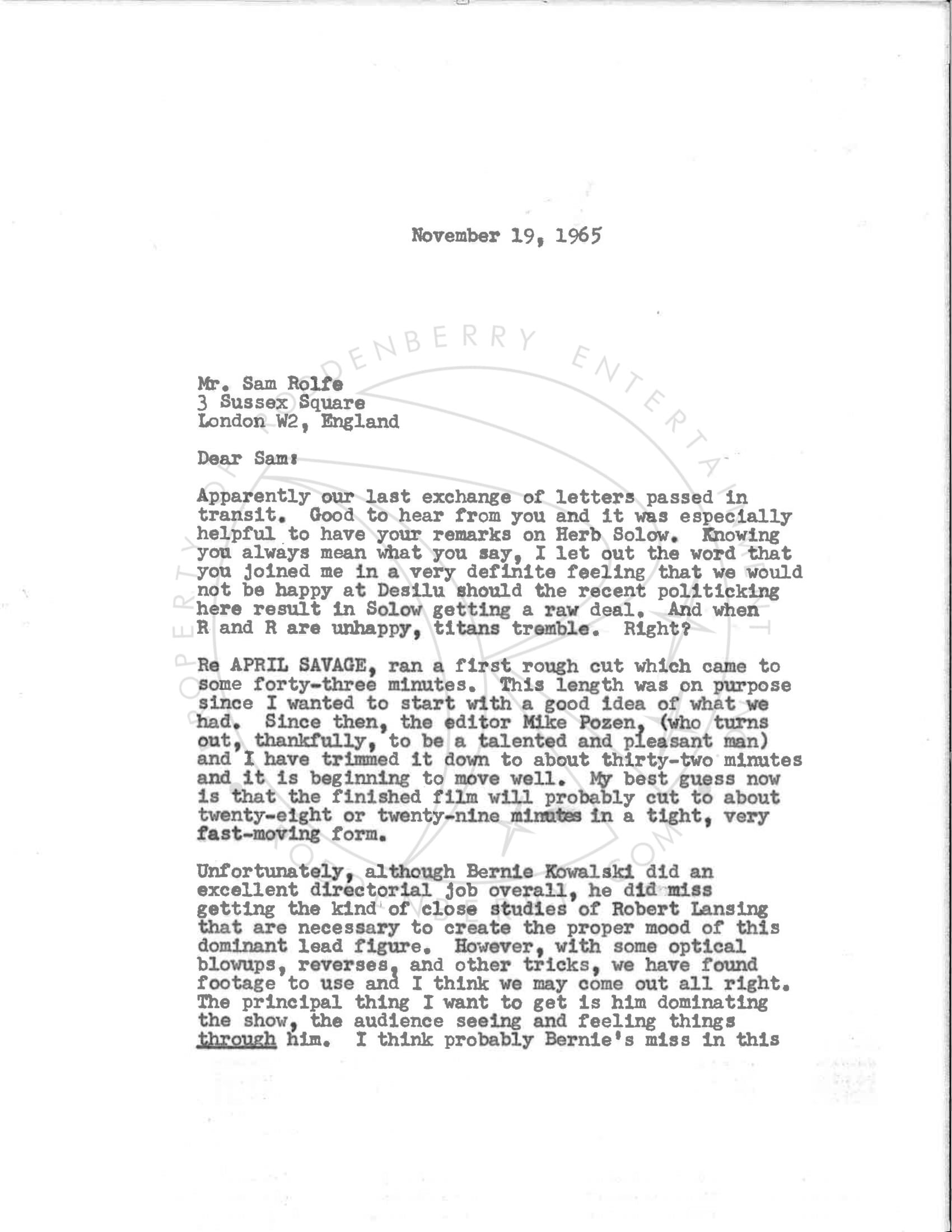
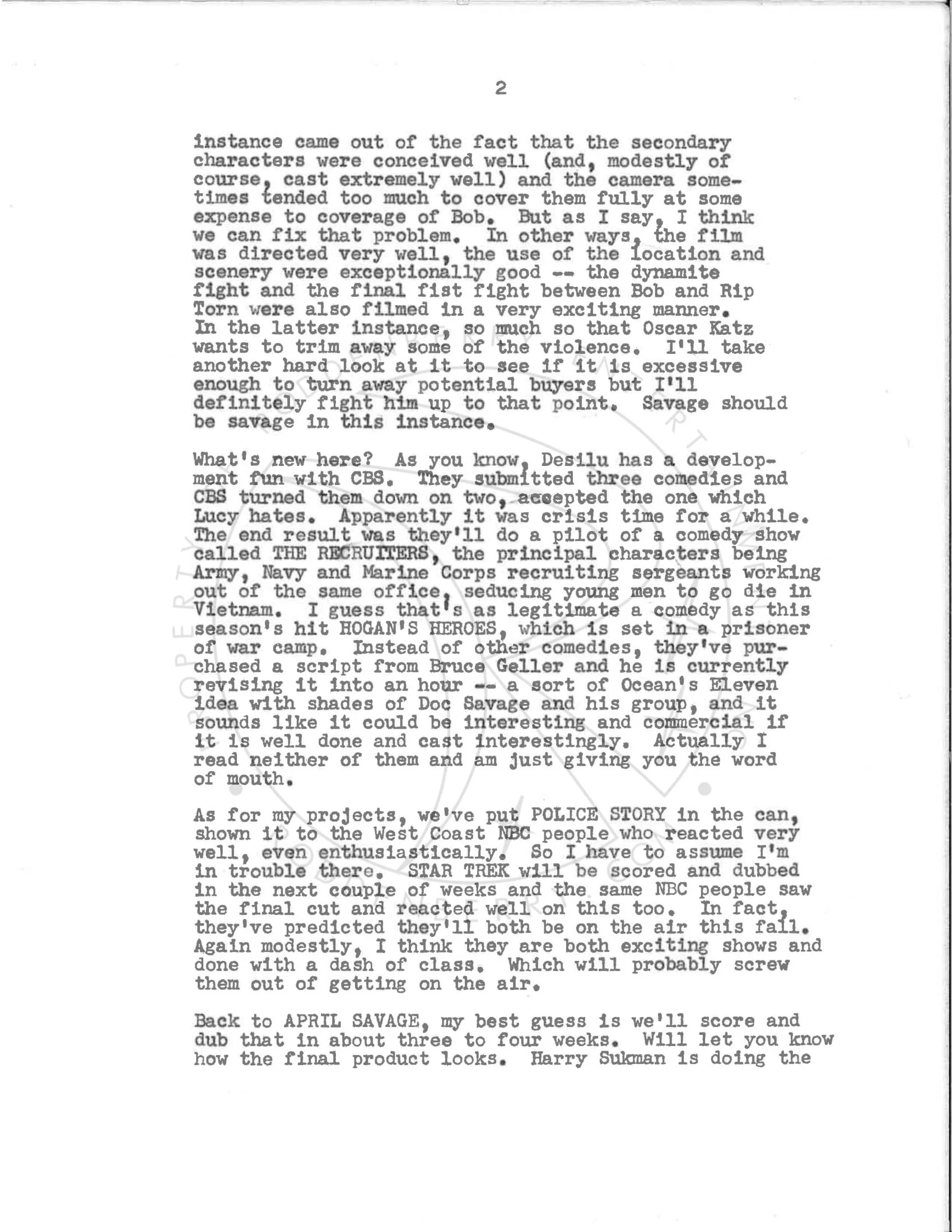
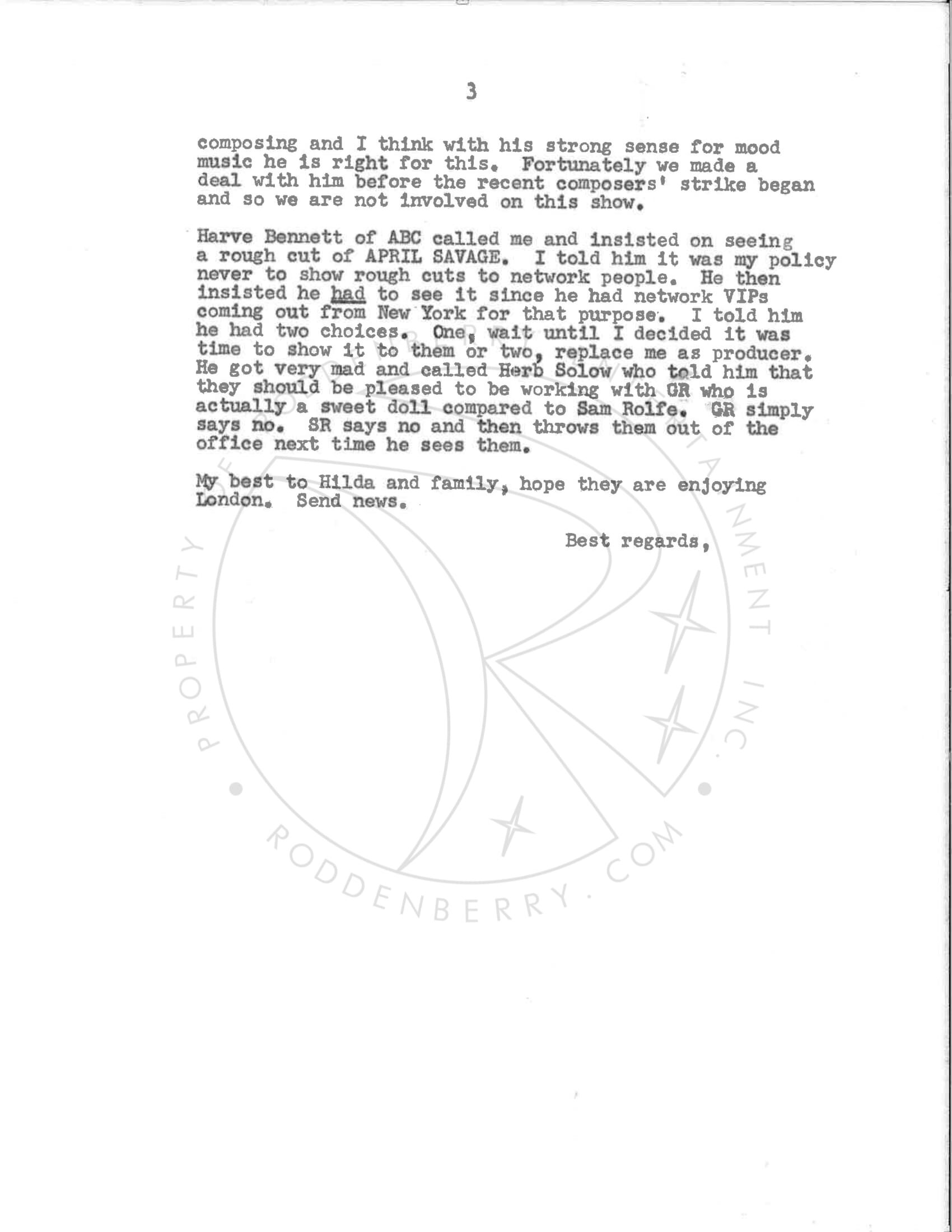
(Thanks to Larry Nemecek & The Trek Files for unearthing this letter.)
A month later on December 15, 1965 Roddenberry wrote David Hedley at NBC about the pilot.[23] Notably he said:
“Our POLICE STORY showings, you will be happy to hear, have elicited great enthusiasm from all who have seen it so far. It has been the first time in my career that audiences have applauded even the teaser.”
But Roddenberry could hardly be considered an impartial observer. He was out to sell the show, after all.
Police Story aired after two other ‘Maybe’ shows.[24]
So Police Story finally got its moment in the sun when NBC screened it—a year to the day after Star Trek’s premier—as part of that NBC “sneak preview” week wherein the network burned off some unsold pilots. We don’t know what the majority of the audience thought of it, but Les Brown’s September 13, 1967 review in Variety savaged it.[25]
“Police Story" doesn't have a lot of things—originality, dramatic tension, character interest or good writing—but chiefly what it lacks is that ineffable chemistry in a pilot that conveys a sence [sic] of all the elements working together, whatever their individual worth.The two leads, Steve Ihnat and Gary Clarke, are goodlooking fellows who don't for a minute convince that they're on a police force.
Brown concluded his critique in a manner that brings to mind reviews of the Roddenberry produced Star Trek—The Motion Picture…
This is a cold pilot. The people in it don't seem to feel a thing for each other, and needless to say the viewer maintains his own aloofness all the way.
Ouch.
Apparently, NBC didn’t take very long to make their decision this second time. By the time Roddenberry was writing Alexander Courage a letter about the royalties to the Star Trek theme music four weeks later, he indicated that the Police Story pilot had “unfortunately not sold.”[26]
What If…?
But what if NBC had picked up Roddenberry’s cop drama?
Had Police Story been picked up on the first go round, well, Star Trek as we know it would not exist, because DeForest Kelley and Grace Lee Whitney would likely have stayed with Police Story, and thus different actors would have been cast as the starship’s doctor and the captain’s yeoman. Furthermore, it’s interesting to speculate how Roddenberry would have split his time between them. Roddenberry famously/infamously rewrote a lot of scripts in Trek’s first season, something he’d have had less opportunity to do with two shows to run.
And if Police Story had been picked up after NBC’s September 1967 dead pilots experiment? Well, Kelley’s role as Charlie Green would almost certainly have been recast. Whitney had been let go from Star Trek a year earlier, but given the circumstances of her unwilling departure it seems unlikely she would have been brought back.
Newspaper photo for the Police Story airing. [27]
The Rest of the “Story”
Just a few years later, in 1973, NBC would pick up a pilot called Police Story created by an ex-cop. But Joseph Wambaugh’s Police Story would go much further than Roddenberry’s, lasting five seasons, generating three spin-offs (Police Woman, Joe Forrester, and Man Undercover), and influencing many cop shows to come.
Roddenberry spent much of his early writing career turning in scripts about the police and the courts, including The Lawbreakers (1963-64), Highway Patrol (1955-59), and Mr. District Attorney (1954). As far as we can tell, Roddenberry’s Police Story script was the last time he touched the subject in a contemporary setting, but there may be scripts and treatments out there we are of as yet unaware of.
Police Story also appears to have marked the final time that Roddenberry wrote television material intended to be shown in a half-hour time slot. When he cut his teeth as a writer in the late fifties and early sixties, half-hour dramas were all the rage[28] and he wrote for many of them, including I Led 3 Lives (1953-56), West Point (1956-57), Dr. Christian (1956-57), Whiplash (1960-61), and Have Gun — Will Travel (1957-63). By the season Police Story finally aired, however, half-hour dramas were on the wane. That year, only three half-hour dramas would premiere in prime time—Gentle Ben (1967-69), N.Y.P.D. (1967-69), and The Guns Of Will Sonnett (1967-69)—and they’d all be gone before the end of the decade. (Interestingly, the initial version of Police Story written by Robert Blees was reportedly intended to be an hour-long show, but by the time Roddenberry took full control, the program was a half-hour.)
And so Police Story vanished, perhaps never to be seen again, Kelley and Whitney went on to do Star Trek, and the rest—as they say—is history.
Case closed.
— 30 —
NOTE: An abbreviated version of this article originally appeared as a series of Tweets on the Fact Trek Twitter feed on September 8, 2020.
See also…
The Greatest Shows You Never Saw (1996) Full program on YouTube (as of this posting). Police Story appears at 19:10 (link).
Revision History
2020-09-23 Original version.
2021-07-29 We moved the section on NBCs “maybe week” from near the top to where it fit chronologically in the history of the pilot. Citation numbers were updated to reflect this change.
End Notes & Sources
[1] Footbeat Half-Hour Series Proposal, Undated. UCLA, Paramount TV Collection.
[2] Desilu Stockholders Told 22 Shows in Development for TV Schedules, Weekly Variety, August 8, 1964, p29.
[3] Richard Irvin, The Forgotten Desi and Lucy TV Projects (2020), p148.
[4] Irvin, p.149.
[5] Note mentioning Blees from Gene Roddenberry to Joe D’Agosta, re Sandra Darrow, June 14, 1967. UCLA, Gene Roddenberry Star Trek television series collection, 1966-1969
[6] Police Story publicity still of Ihnat and Clarke and caption sourced from Linda Alexander’s book The Life and Death of Rising Star Steve Inhat, Gone Too Soon (2018). As of this writing the book is available here (link).
[7] David Gerrold, The World of Star Trek (1973), p.88.
[8] Grace Lee Whitney, The Longest Trek: My Tour of the Galaxy (1998), p.70–71.
[9] The Greatest Shows You Never Saw (1996) (link). First aired on CBS, February 7, 1996.
[10] NBC-TV Sifting Its Projects for ‘66–’67, Weekly Variety, August 18, 1965, p24.
[11] Whitney, ibid.
[12] Herbert F. Solow and Robert H. Justman, Inside Star Trek: The Real Story (1996), p.89.
[13] David Alexander, Star Trek Creator: The Authorized Biography of Gene Roddenberry (1994), p233–234
[14] William Overend, Fighting Crime and Writing--Novel Combination for L.A. Cops: Police Find Fame and Fortune With Literary Moonlighting, Los Angeles Times, April 15, 1984, p.e1, e8.
[15] NBC-TV Sifting Its Projects for ‘66–’67, Weekly Variety, August 18, 1965, p24.
[16] Email correspondence with Jon Burlingame, June 13, 2020.
[17] NBC Tests Possible Shows This Week, The Courier, Waterloo, Iowa, Friday, September 1, 1967, p39.
[18] NBC Offers Specials Eight Pilot Films to Be Shown, The Decatur Daily Review, Decatur, Illinois,Tuesday, September 5, 1967 p13.
[19] NBC Plans 'Maybe' Week, Bill Ladd's TV Almanac, The Courier, Louisville, KY, Monday August 14, 1967, pB2.
[20] Sheldon Added to NBC Stable Of 'House' Producers; Multi Projects Via Huggins, Sommers, Roddenberry, Weekly Variety, August 23, 1967, p.29.
[21] Desilu in Deal With NBC On 2 Roddenberry Vidpix, Weekly Variety, July 12, 1967, p.30. (In our initial tweets that formed the basis of this article, we suggested some trade papers reported that Yankee Gunfighter was to be an hour-long show, but that was in error. All the reports we’ve found, in both Broadcasting and Variety either identify it as a 30 minute show or do not specify the intended length.)
[22] Letter from Gene Roddenberry to Sam Rolfe, November 16, 1965, via Roddenberry Entertainment, Inc.
[23] Letter from Gene Roddenberry to David Hedley, Director, TV Program Presentations, NBC, December 15, 1965. UCLA, Gene Roddenberry Star Trek television series collection, 1966-1969.
[24] Friday Night TV listing, Courier-Journal, Louisville, KY, Sunday, September 3, 1967, p71.
[25] Police Story review, by Les Brown, Variety, September 13, 1967.
[26] Letter from Gene Roddenberry to Alexander Courage, October 3, 1967. UCLA, Gene Roddenberry Star Trek television series collection, 1966-1969.
[27] NBC to Air Sneak Previews of 8 ‘Maybe’ Shows, Press and Sun-Bulletin, Binghamton, New York, August 26, 1967, Saturday, p18.
[28] On The Roddenberry Vault (home video release), “The Trouble with Tribbles,” David Gerrold/David A. Goodman Commentary (2016) (approx. 30:56-31:09), Gerrold suggested that hour-long dramas were a relatively new thing in Star Trek’s time, claiming:
“I had learned how to do the hour-long format, so I had a skill that was kind of rare in just that brief moment of time.”
This would come as a surprise to Gene Roddenberry (whose hour-long The Lieutenant ran from 1963–64) and all the people who’d been writing for Bonanza (1959–1973), Wagon Train (1957-65), and more than 40 other hour-long dramas we can think of that aired in the decade preceding Star Trek. The change was that half-hour dramas were waning, not that hour-long dramas were new.

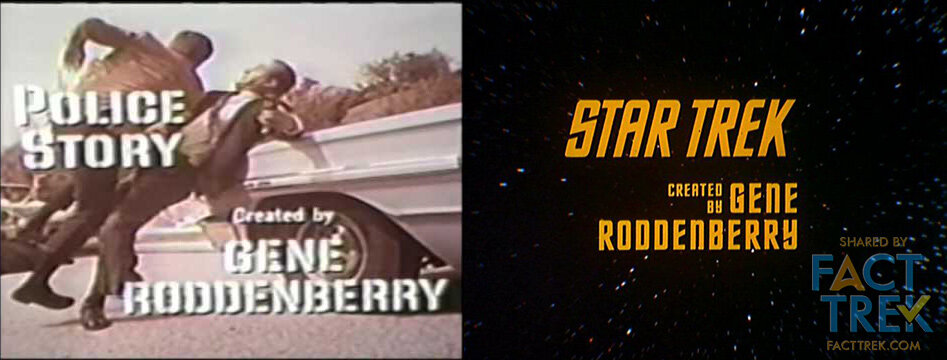
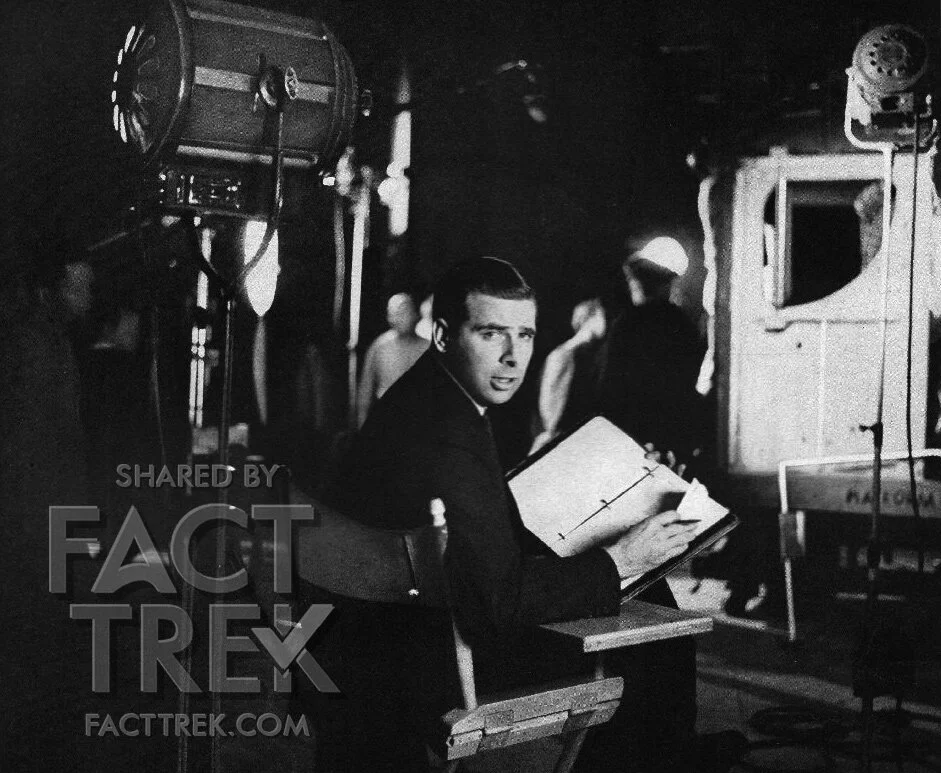






![Newspaper photo for the Police Story airing. [1]](https://images.squarespace-cdn.com/content/v1/5d8938941257b15f27f817c2/1600637170558-ULFX4IYPKLS4BIA2CIEI/1967-08-26-Sat%2C-Call-the-Cops%2C-Press_and_Sun_Bulletin_adjusted-v2.jpg)